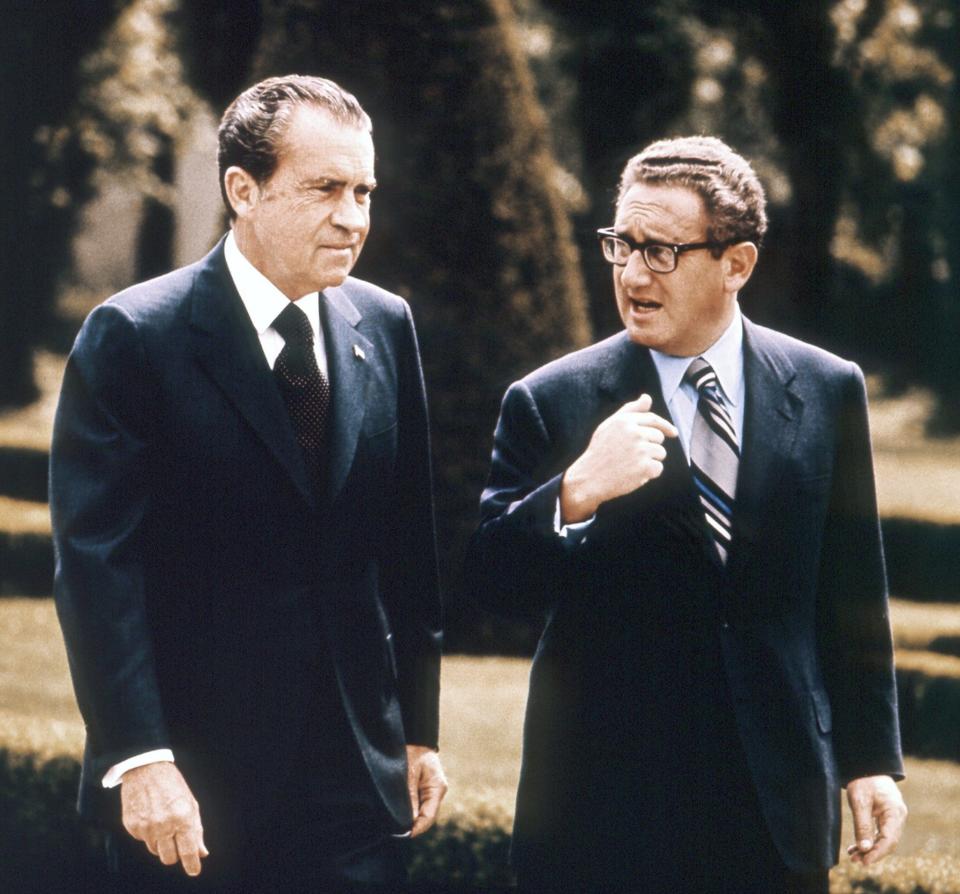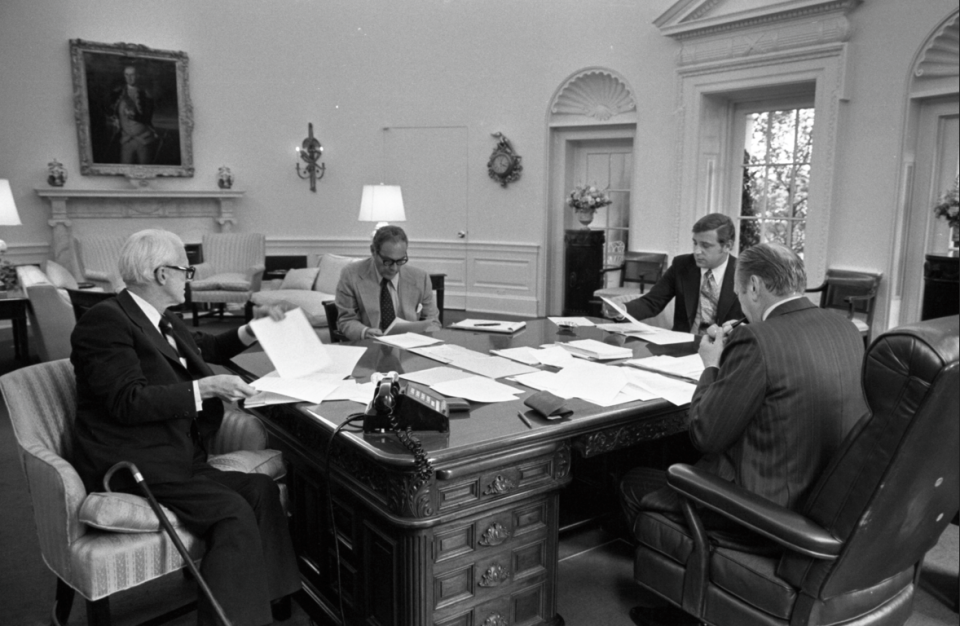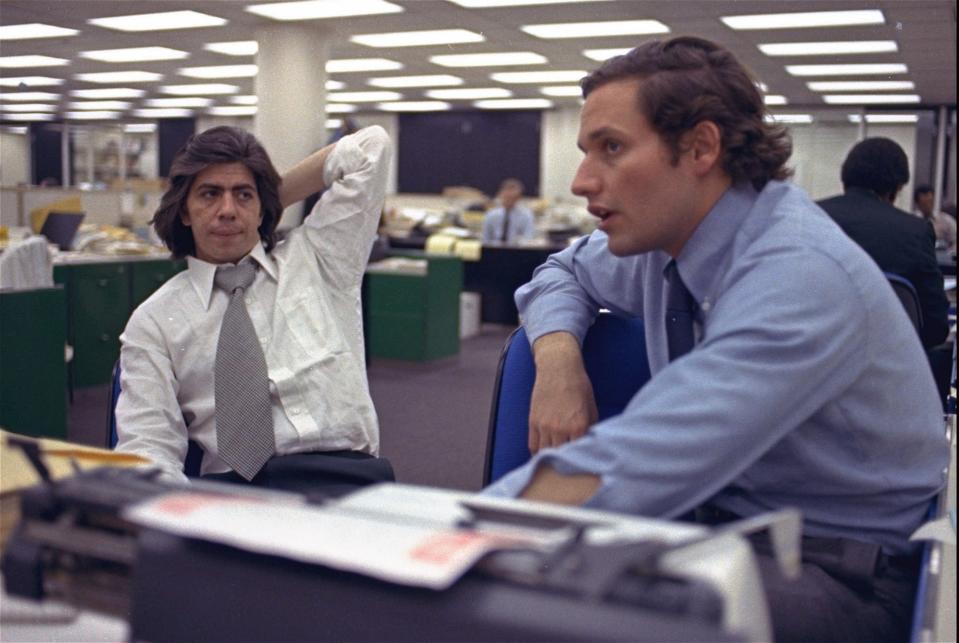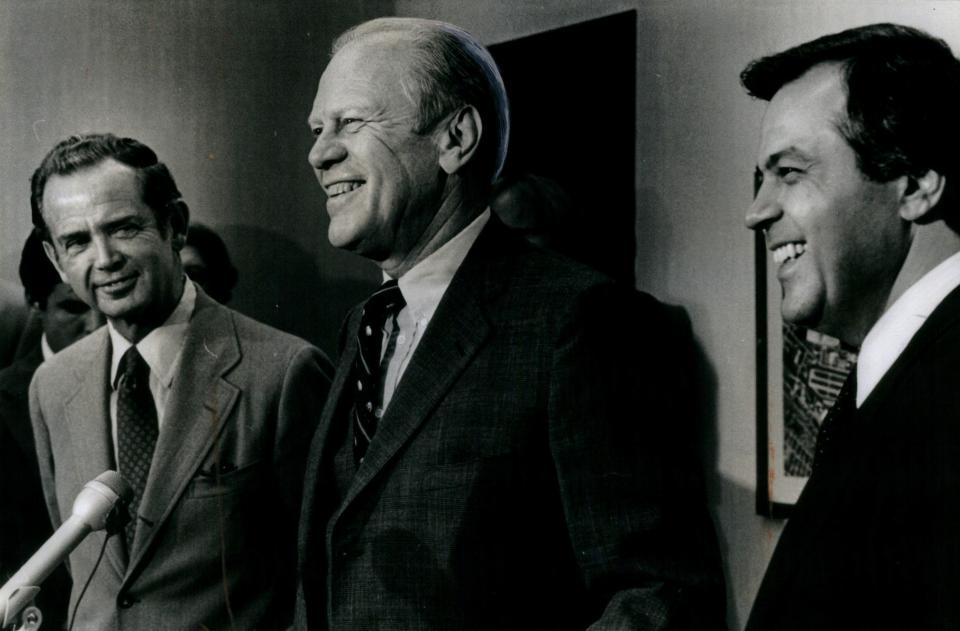Woodward and Bernstein: Watergate does not offer a roadmap, guidance for dealing with Trump
- Oops!Something went wrong.Please try again later.
- Oops!Something went wrong.Please try again later.
- Oops!Something went wrong.Please try again later.
- Oops!Something went wrong.Please try again later.
- Oops!Something went wrong.Please try again later.
The legendary reporting duo that helped bring down a U.S. president half a century ago says the legacy of the Watergate scandal does not offer much guidance for the country in navigating the fraught political gauntlet that is another Donald Trump presidential candidacy.
The digging and probing stories that Carl Bernstein and Bob Woodward wrote for The Washington Post starting in June 1972 ultimately led to the resignation of President Richard Nixon on Aug. 9, 1974. The two subsequently became celebrity journalists who inspired generations of American youths to follow the trailblazing path they set as watchdog reporters.
Today, Bernstein, an investigative journalist and author, is a frequent commentator on network news programs in which he has been called to give perspective on the Nixon scandal and the criminal cases against Trump. Woodward has written a trilogy on the Trump presidency and its aftermath. On Thursday, Feb. 8 and Friday, Feb. 9 the pair will speak at Florida Atlantic University's campuses, first in Boca Raton and then in Jupiter.
In those appearances, Woodward and Bernstein may draw sharp contrasts between the two presidents, their scandals and America then and now.
"We have [a] totally different set of circumstances and [a] totally different political culture and I think we need to look at things in their own time," Bernstein said recently.
Watergate 50 years later: Lessons for America today?
The revelations in Woodward and Bernstein's reporting were advanced by congressional hearings that unearthed more shocking actions and behaviors by Nixon and his White House staff. They amounted to a conspiracy that included the attempt to bribe the men caught in a break-in at the Democratic National Committee and a broad campaign of political dirty tricks.
Ultimately, Woodward explains, Nixon faced certain conviction in a U.S. Senate impeachment trial and expulsion from the White House according to the rules set out in the U.S. Constitution. Woodward recounts his reporting and writing from the era in which the respected leader of the Republican caucus, U.S. Sen. Barry Goldwater of Arizona, told Nixon at the White House that he could count on just a handful or so of votes in the Senate, and his was not one of them.
Nixon resigned the next day, and a legacy of disgrace followed him out of Washington.

"As you travel around the country, one thing you never see is the Richard Nixon elementary school, or junior high or high school," Woodward said. "His reputation is solidified by the tapes that not only showed criminality but a brazen disregard for what is the national interest, what's best for the country."
After returning to civilian life, Nixon faced indictment for his involvement in the Watergate crimes but was spared prosecution when, in September 1974, he was granted a pardon by his successor, Gerald Ford.
By then, Woodward and Bernstein had published their account of breaking the Watergate scandal, All the President's Men, which they wrote over 10 weeks at a home Woodward's mother owned in Naples.
The two had a rule: write 10 pages a day, each. Woodward recalls Bernstein completing his mission by the pool decked out in "these awful green shorts."
Views of Nixon's pardon have evolved over time, but still a point of debate within Trump context
Ford's pardon of Nixon has again become a flash point of debate nearly five decades later.
Negotiated by an attorney named Benton Becker, a Ford legal confidante and later a resident of Boynton Beach, the pardon allowed the nation and its government to move forward and heal. Ford, who was vilified a half-century ago, was awarded the John F. Kennedy Profiles in Courage Award in 2001 by U.S. Sen. Edward Kennedy, D-Massachusetts, one of the pardon's harshest critics.
The Nixon pardon: It was negotiated by a Boynton Beach lawyer. Did it leave a road map for Trump post-presidency?
A chorus of voices today do question if the pardon was a mistake. An indictment against Nixon, and perhaps a prosecution, might have been a deterrent to future presidential wrongdoing, some say.
Others say at the very least allowing the legal process to move forward would have resolved issues that are now before the courts today — such as Trump's claim that presidents have absolute immunity for actions undertaken when in office.
Former Watergate prosecutor, Jill Wine-Banks, said she still chafes when recalling Nixon telling interviewer David Frost in 1977 that "when the president does it … that means that it is not illegal" and notes that is what Trump is arguing now.

Wine-Banks said a fair trial in which the facts of the case are laid out and in which a jury issues a verdict would have best served the nation.
"It was not in the best interest of the country to pardon Nixon," Wine-Banks told The Palm Beach Post last year. "An exposition of the facts in a courtroom is what is in the best interest of the country."
Trump's claim of immunity was struck down Tuesday unanimously by the D.C. Circuit Court of Appeals. The case could eventually reach the U.S. Supreme Court. In the meantime, one of the two federal cases against him is frozen pending resolution of the argument.
On Sunday, Feb. 4, Trump posted in all capital letters: "IF IMMUNITY IS NOT GRANTED TO A PRESIDENT, EVERY PRESIDENT THAT LEAVES OFFICE WILL BE IMMEDIATELY INDICTED BY THE OPPOSING PARTY. WITHOUT COMPLETE IMMUNITY, A PRESIDENT OF THE UNITED STATES WOULD NOT BE ABLE TO PROPERLY FUNCTION!"
Woodward, Bernstein defend the pardon of Richard Nixon decades later
Bernstein recalled hearing about Ford's act of forgiveness on the radio and immediately dialing Woodward's phone number.
"I called Woodward, who was not quite awake, and I said, 'Did you hear the news? And he said, 'No, what news?' " Bernstein recalls. "And I said, 'The son of a bitch pardoned the son of a bitch.' "
Fifty years later, the two said they believe the pardon served the country well.
Woodward insists that in the post-Nixon resignation era, the nation was still consumed by Watergate, and the potential prosecutions of the former president and his administration's accomplices. That made addressing the ongoing conflict in Vietnam, inflation and other issues a practical impossibility for the new Ford administration and the Congress.

"You have to ask a very large question: What's in the national interest," Woodward said. "The national interest, when you look back at it, was get Nixon off the front page. Get Nixon's tapes. Stabilize the political situation. And the idea was to make Nixon less relevant."
Woodward said he interviewed Ford in later years and decades about the pardon and the 38th president knew he was going to get "slaughtered politically" over the decision. Woodward said Ford told him words to the effect of: "I needed my own presidency. The country needs a new president, there were a series of issues so my final conclusion was that it was an act in the national interest."
Bernstein said it was a "courageous" move albeit that it cost Ford a high political price.

"It was a courageous act in particularly in that it was an example of a president of the United States who knowingly sacrificed, in all likelihood, of being president of the United States for principle," he said.
There lies the distinction that makes Watergate a moment in time rather than a precedent-setting road map for the country today, both said.
"Of course, at that time in the 1970s, no one could foresee Trump or that there would be another president like this," Woodward said.
"And no one could foresee a Republican Party that was utterly unconcerned by the criminality of the president of the united state of their own party," Bernstein added.
A clarion call for journalists to do their job so the "truth emerges"
As for the Trump case, Bernstein said the answer will be forthcoming as "in all likelihood" the U.S. high court will "answer definitively these questions that have to do with 'can [a] president be held legally accountable?'"
Woodward quoted his and Bernstein's editor at The Washington Post, Ben Bradlee, in saying it's up to journalists to continue their work and lay out the facts for Americans.
"The truth emerges from more reporting and we've been able to do that," he said.
Bernstein agreed.
"We got plenty of reporting to do" he said. "If there ever was a time to be in the present it's now because Trump has laid down a set of challenges for the present, not for the past, and it seems unlikely that he's the kind of person that wouldn't have laid down these monumental challenges regardless of what the precedents were."
If you go: A Conversation with Bob Woodward and Carl Bernstein From Watergate to Today
WHAT: Osher Lifelong Learning Institute at FAU presents "A Conversation with Bob Woodward and Carl Bernstein From Watergate to Today: Journalism, Accountability, and the Current Challenges to American Democracy," moderated by Dave Aronberg, State Attorney for Palm Beach County.
WHEN: Thursday, Feb. 8, at 7 p.m. in the Carole and Barry Kaye Performing Arts Auditorium at the FAU Student Union in Boca Raton. Friday, Feb. 9 at 2 pm at the Osher Lifelong Learning Institute Auditorium at the FAU Jupiter campus.
TICKETS: Tickets are $65 for OLLI members and $75 for non-members. Same-day tickets, if available, are $75 at the door. Tickets for the Boca event can be purchased by going to olliboca.fau.edu/wordpress/ while tickets for the Jupiter appearance can be purchased by going to www.fau.edu/osherjupiter/.
Antonio Fins is a politics and business editor at The Palm Beach Post, part of the USA TODAY Florida Network. You can reach him at afins@pbpost.com. Help support our journalism. Subscribe today.
This article originally appeared on Palm Beach Post: Woodward and Bernstein talk Watergate, Trump at FAU in Boca, Jupiter

